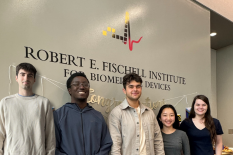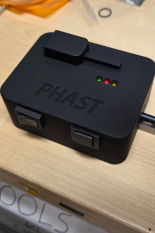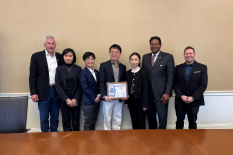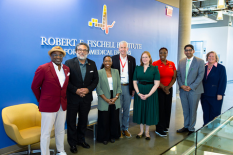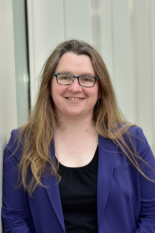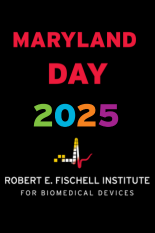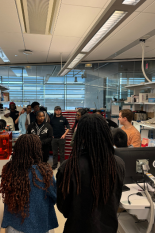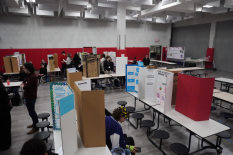News Story
Fischell Institute Summer Interns Participate in 2025 Research Symposium
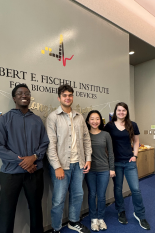
On Thursday, August 21, the Robert E. Fischell Institute for Biomedical Devices hosted its annual Summer Intern Research Symposium, during which the 2025 summer research interns presented the projects they worked on and reflected on their experience in the program.
“The Intern Research Symposium highlights how quickly students can grow when given the opportunity to work in an interdisciplinary setting,” said Fischell Institute Director William Bentley. “Their work this summer not only contributed to ongoing research but also pushed us to think about new possibilities in healthcare solutions.”
Noah Cauchi, a rising computer engineering senior who worked in Bentley’s Biomolecular and Metabolic Engineering lab, discussed his project leveraging vision-language models, an artificial intelligence technology similar to ChatGPT, to interpret graphs of electrochemical data and assist scientists in answering technical questions about their experiments. Cauchi’s work included curating data, fine-tuning it with supervision, evaluating model performance and implementing reinforcement learning from verifiable rewards to refine model accuracy.
Joshua Dayie, a rising chemical engineering senior at the University of Maryland, Baltimore County, also worked in Bentley’s lab. His internship focused on engineering an enzyme in the pyocyanin biosynthetic pathway, with the goal of regulating production through microelectronic stimuli to enable the controlled outputs of molecules that influence population-level behaviors.
Rising bioengineering junior Kaitlyn Ro spent her summer in the lab of Institute for Bioscience and Biotechnology Research (IBBR) Professor and Fischell Institute Fellow Gregory Payne. During the internship, she evaluated a systems-level measurement of oxidative stress for a study testing how dietary interventions affect mental health. The samples measured were collected from a clinical study conducted at the Maryland Psychiatric Research Center to investigate the effects of gluten on individuals with schizophrenia and gluten sensitivity. Ro’s efforts offer researchers and clinicians a better understanding of interactions across the gut-brain axis.
Christine Needham, a rising senior majoring in bioengineering, worked in mechanical engineering Assistant Professor and Fischell Fellow Davis McGregor’s Manufacturing Intelligence Research and Advanced Geometry Evaluation (MIRAGE) Lab.During the internship, Needham explored additive manufacturing of complex lattice structures for potential use in traumatic brain injury prevention. Her project focused on 3D-printed sensors for biomedical applications and producing conductive lattices using Fused Filament Fabrication (FFF) 3D printing with the goals of both detecting and reducing the level of impact that occurred. By compression-testing various architectures, a link was established between lattice geometry and sensor accuracy, with auxetic structures showing the most promise for impact detection and attenuation.
“Every year, our interns bring fresh ideas, energy and innovation to the Institute,” said Ambi Narula, Fischell Institute communications and program specialist, who organizes the internship program. “Seeing them present their projects with such confidence and passion reminds us why mentorship and hands-on research are essential to shaping the future of engineering.”
Published September 11, 2025
